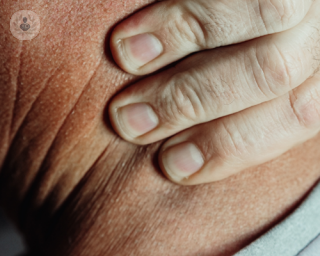Chronic pain
Dr Husham Al-Shather - Pain medicine
Created on: 11-13-2012
Updated on: 11-02-2023
Edited by: Sophie Kennedy
What is chronic pain?
Chronic pain, sometimes described as persistent pain, refers to pain which lasts for longer than 12 weeks, despite medication or treatment being prescribed. Usually, over time, pain settles, but in some cases it can go on for a long time, affecting mental wellbeing, and causing discomfort and distress to those experiencing it.
Chronic pain is relatively common, with estimates from a 2018 BMJ study putting its prevalence in the UK at 43 per cent.

What causes chronic pain?
Chronic pain can happen as a result of an injury, or after an operation. Normally the pain we feel after trauma goes away after a while, but in some cases the pain can be chronic. Nerves can be damaged after trauma, which results in pain being more intense, and lasting longer.
Those with certain conditions can also experience chronic pain, such as those with diabetes, fibromyalgia, irritable bowel conditions, endometriosis, chronic fatigue syndrome, arthritis, and back pain.
Chronic pain can also occur without any obvious cause or trigger. This can be frustrating as medical tests do not always show the reason behind why you are experiencing the pain, or offer a clear source.
What are the symptoms of chronic pain?
Chronic pain refers to symptoms of pain lasting over 12 weeks, but you may also experience some of the following symptoms as a result of pain affecting your physical and emotional health:
- Anxiety
- Depression
- Lack of sleep
- Loss of libido
- Fatigue
- Irritability
How is chronic pain treated?
While it was once treated by bed rest, it is now known that the key to recovering from chronic pain is through exercise, and resuming normal activities. This is because resting for long periods causes your body to stiffen through inactivity. It is also not good for your mental health, as you can begin to feel lonely or may suffer the symptoms of depression.
Chronic pain is now typically managed through a combination of resuming regular activity, exercise, physical therapy, and pain medication. Some may also choose to visit or be referred to a psychologist to help them cope with feelings of anxiety or depression.
Speak to your GP to come up with a treatment plan and for specialist referral if necessary. Many doctors can help with chronic pain, including pain management specialists, sports medicine doctors, rheumatologists, and neurologists.

















